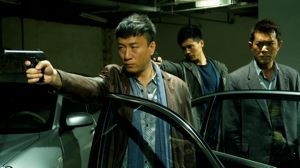Page one, line one of Film Studies 101: "Cinema is a visual _medium." Sounds obvious to a sign language expert like you, right? But it's amazing how few films truly embrace this fundamental principle as effectively as _Drug War. Chinese director Johnnie To has created a riveting thriller that plays like a master class in visual communication. The script has plenty of great dialogue scenes, but not a single word is wasted on something that is better off shown. As a result, I couldn't take my eyes off the screen from the very first scene.
That's the sign of a great film.
We open on the image of a car screeching through the streets. The driver is passing out at the wheel with chemical burn marks all over his face before crashing into a crowded restaurant. Cut to border crossing in mainland China, where a bus full of sick and nervous passengers run away when they're pulled over. During the chase, one of the escapees drop-kicks a fellow fugitive. The fancy footwork is from an undercover cop (Sun Honglei), who soon after revealing himself, has to watch these drug mules excrete their tiny balloons of crystal meth under excruciating pain. This quickly connects back to the original driver, who is discovered to be a drug cartel Lord named Timmy Choi (Louis Koo). After a feverish chase through the hospital, he agrees to expose his supply network to avoid the death penalty. But no one can see just how far his connections go.
You, of course, were hired to help in the sequences with the Dumb Brothers (as the English credits call them), deaf drug manufacturers who only communicate through sign. That quirk in a couple of secondary characters would be enough for most filmmakers, but not Johnnie To. We're introduced to "Senior Dumb" in a short five-second shot where he's showering with a bulletproof vest on. Seriously, what more could I hope to learn about the guy? His paranoia and preparedness is all the foreshadowing needed for the character. His actions say everything - even more than the sign language.
They're almost like the numerical telephone code used by the drug dealers, which only allows for essential key words. It's not an issue; the interpreters simply fill in the obvious prepositions, pronouns and articles. I can almost imagine the screenplay written the same way. Forget the flowery adjectives. Stick to bold nouns, blunt verbs, and make everything in the present tense. Exposition, banter and back-story be damned. And amen to that.
Yet one of the most memorable sequences involves a mostly verbal confrontation between the undercover officer and upper members of the drug ring. Sure, it borrows a lot from the hotel room masquerade in Mission Impossible: Ghost Protocol, but by not spelling out what's about to unfold or the full potential of the characters, the dramatic tension is huge and the comedic pay-offs come as complete surprises. Kind of like the whole of Drug War, which delivers its story with a confidence most other Hollywood films fake worse than a South African interpreter at a Nelson Mandela memorial.
Too soon?
Signing off,
Christopher







